
The Story of Hua Zhi
40 oamenii au considerat această recenzie utilă
Buns of Steel.
Blossoms in Adversity / Xī Huā Zhǐ/惜花芷 is the story of superwoman Hua Zhi's feel-good romp through feudal China. When Imperial Censor Hua dares to criticize the monarch, he is exiled along with all the men in his family. A bevy of helpless women and young children are left to fend for themselves. Hua Zhi takes charge and rallies the women together to triumph against overwhelming odds. When she flexes her buns of steel, no feat is beyond Hua Zhi! She parleys a candied hawthorn business into a pastry and restaurant empire, picks up stray royal children, foils a few palace plots, build schools and a canal, rescues the Hua family men and even manages to find time to fall in love! All in the space of a 2-3 years!!! Phew! Even superwoman would surely stagger from sheer exhaustion!This narrative paints a distressing picture of how oppressive life was for women in hierarchical ancient Chinese patriarchal society. The best part of this drama is how in order to survive, the women defy social conventions, set aside petty differences, learn to trust each other and work together towards shared goals. While the sheer scale of their financial and other achievements are preposterous, there is something very cathartic and satisfying about how flamboyantly they flourish. The storytelling is squarely centered on Hua Zhi and speeds through many of the supporting character arcs, leaving their motivations and struggles under-developed. This is a pity because family dramas like this are most compelling when important supporting characters are given enough agency to be the main characters of their own arcs.
This is one of those dramas that is best enjoyed superficially and with heavy suspension of disbelief. Upon closer scrutiny, the overarching empowerment theme is contradicted by some of the sub-plots. I was disturbed by the different treatment of domestic abuse in Hua Jing and Hua Xian's case. But what I disliked most was what happens to Hua Rong and her child. It is as if she learned nothing from her family's struggles about resilience in the face of adversity. There are a few poorly developed sub-plots like this that the writers raced through without thinking carefully about the messaging.
As much as I like Zhang Jingyi, this is not her best role. Her interpretation of Hua Zhi is too perfect, too calm, too understanding and too reasonable. This has led to many Mary Sue comments about the character. But Hua Zhi is actually written to have many flaws - she can be over confident, she cannot mind her own business, she is reckless and like her grandfather, she cannot hold her tongue. In the canal arc, she is the architect of her own downfall but because everyone unites around her, she never suffers any consequences for her actions. This character has too much plot armor and is already so smart and capable that she shows virtually no growth from beginning to end.
Hua Zhi's relationship with Gu Yanxi is similarly whitewashed to the extent that it appears too ideal to be true; it lacks passion, conflict and intensity. Hua Zhi lets Gu Yanxi off too easily for deceiving her in the beginning when any normal person would be at least a little bit angry at him. She also never communicates any discomfort with his role at the Security Bureau; indeed she seems quite happy to use his authority there to serve her purposes. Thus, it came as much as a surprise to me as it must have to Yanxi that it could be a deal breaker for her! So much for their so called mature, open and communicative relationship! I don't know why young actors like to make their characters so perfect all the time and have such a hard time embracing more complex but perfectly natural human relationship dynamics and emotions.
Hu Yitian delivers a more nuanced portrayal of Gu Yanxi as the emperor's sharpest knife. His fight scenes are phenomenal and he is menacing and ruthless as the commander. He shows us he is a different person; more open, at ease and happier when he is with Hua Zhi. While this is one of Hu Yitian's better roles to date, he shies away from showing us the true extent of his affection for the emperor and his inner conflict. This is a missed opportunity because Hai Yitian delivers a compelling portrayal of the lonely, paranoid and manipulative emperor. Because Hu Yitian's portrayal of Gu Yanxi does not meet him halfway, the emperor's affection for his nephew comes across as borderline obsessive and a lot more one sided than it really is.
Even though it seems her character Shaoyao is dumbed down from the novel, Lu Yuxiao is once again a scene stealer in this drama. This kind of beguilingly innocent, simple minded savant kind of character is extremely difficult to portray well but Lu Yuxiao pulls it off brilliantly. She doesn't get enough screen time to steal the show but I was more invested in her character than I was in Hua Zhi who is too perfect to be relatable.
The ending of this drama really cracked me up. It is one of the few times that the villain actually saves the day by doing what Hua Zhi and Gu Yanxi could never have done. Although it is also possible that Gu Yanxi learned his lesson not to look for needles in hair stacks and had the good sense to show up a just a tad late at the ceremony. Despite some flaws, this is a very appealing feel-good drama for those seeking light entertainment. My rating 8/10.
Considerați utilă această recenzie?
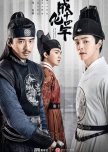
The Sleuth of Ming Dynasty
61 oamenii au considerat această recenzie utilă
The cook, the eunuch and the chowhound - a crime solving menage a trois.
This comedic drama features a wildly imaginative yet oddly fitting crime fighting menage a trois comprising of a low (sixth) ranked magistrate (Tang Fan), a high-ranked embroidered guard (jingyi wei; Sui Zhou) and an influential eunuch (Wang Zhi) with the emperor's ear. Their paths intersect on cases with national security implications and while they have different agendas and masters, their synergistic and mutually beneficial collaborations blossom into friendship. The three main characters are well written - their bromance, hilarious antics and interactions are this drama's greatest strength.With an irrepressible grin and a wicked gleam in his eyes, Darren Chen really hams it up with his cheeky, flirtatious and sometimes deliberately irritating characterisation of the titular Tang Fan, an idealistic young magistrate who is more of a chowhound than a sleuthhound. The talented and willowy Tang Fan is a very pretty boy with delicate and vivacious features who embraces his feminine side with abandon and is passionate, emotional, naggy, petulant, petty and vengeful. This outrageously funny character writes erotic novels to supplement his puny income, lives to eat, seems extremely well acquainted with the how to but yet can't cook to save his life. He happily moves in with the gorgeously taciturn, moody, much more masculine and deadly Sui Zhou who steals Tang Fan's heart with his ability to cook a mean meal. There is enough in their interactions and suggestive domestic arrangement to get the BL fans all hot and bothered without running afoul of Chinese censorship. And then of course there is Wang Zhi, the most morally grey and dangerous of the three. He approaches relationships transaction ally - "you scratch my back I'll scratch yours" and is unambiguous about his first loyalty to king and country. Newcomer Liu Yaoyuan's portrayal of the ruthless, calculating and yet inexplicably likable Wang Zhi nicely rounds out this kinky threesome. Between them, they are able to marshal resources from the lowest to highest reaches of society to solve their cases.
Set at the heart of the capital during the Chenghua reign of Ming Dynasty, the important characters and events of the period are nicely tied into the overall plot-lines. The surrounding characters were somewhat cliche but mostly well done from the "adopted daughter" Dong'er, the miracle doctor, the Oirats, Wang Zhi's beggar informants and the rare treat of a smart and hot emperor. The cases run the gamut from crimes of passion, corruption, larceny, terrorism and climaxes in a dangerous conspiracy reaching the highest ranks of government. Most surrounding characters including the villains have recurring roles in subsequent cases which gives them dimension and avoids the confusion of excessive character introductions with each new case. The cases shouldn't be taken too seriously; while they are fun and quite interesting, they are not that original or that difficult to solve and have some logic holes and are thus unlikely to satisfy a serious crime or mystery buff. The rhythm of the investigations frequently digress into inane and somewhat childish hit or miss comedic sketches that can go on for too long. There is a slight misogynist undertone to this drama - even the likable women have unflattering traits (stupid, noisy, whiny, irrational), or worse are power hungry, traitors, extremists or come to a bad end.
The tightly choreographed action scenes are signature Jackie Chan - lethal, gripping, high impact, extremely acrobatic and fluid poetry in motion. They are not excessive, do not drag on for too long and avoid the mid-combat slapstick moments he used to be so fond of; all good changes. The camerawork is stunning and very artistic, approaching movie quality. They obviously spared no expense with this and it shows.
For those who grew up on Jackie Chan, the Sleuth of Ming Dynasty is a fun romp down memory lane. There is a bit of the artistic Jackie Chan, the wacky whack-y Jackie Chan, the comedic Jackie Chan, the high testosterone Jackie Chan, the innovative Jackie Chan, the crass Jackie Chan and finally and pleasingly, the mature Jackie Chan. I outgrew his flicks ages ago - after awhile I found the hair rising stunts, high speed chases and exaggerated comedic routines repetitive, shallow and draining. So I am pleasantly surprised to see in this drama that maturity has toned down and balanced some (not all) of his more extreme inclinations while still remaining essentially Jackie Chan. It is also nice to see the uniquely Jackie Chan inspired Hong Kong wu da pan (武打片) sub-genre with its chauvinistic, contradictory, cynical, sarcastic yet sentimental and idealistic spirit has evolved for the better but is still innately the same.
This is highly entertaining and enjoyable if you don't look too hard at it or seek profound meaning. It is not always my sense of humor and the cases are solid but not exceptional so I rate it an 8.5 but I can see why others would call it a 9.0 or better.
Considerați utilă această recenzie?

Qing Qing Zi Jin
29 oamenii au considerat această recenzie utilă
Poetry in motion.
This is a really fun and adorable school romance drama that will steal your heart. It carries the underlying message that education should be a universal right but it does not necessarily produce a moral person.Wen Renjuan is swept off her feet by a seemingly wicked man from a different world in a brief but unforgettable encounter. They reunite at the prestigious Zhuxiu Academy after Luo Qiuchi wins a place in a national poetry competition. Of course it is impossible back then for even elite young women to be formally educated, in a co-ed academy no less! But since the setting is so much fun and it avoids the muss and fuss of the cross dressing trope, let's let that one slide. This is mostly a coming of age character drama that explores class conflict and how different students of Zhuxiu Academy respond to competition, envy and disappointment in academics and relationships.
The best thing about this drama is watching the character and relationship development of the two main couples - it is literally poetry in motion. Both couples are lovable and so convincingly "belong together" I have a hard time picking a favorite. Renjuan is the character that grows the most in the drama - she blossoms from a timid girl into a feisty, clever and simply irresistible young beauty who fights fiercely for her beliefs. Lu Xiaolu is simply a joy to watch in this role; she has the cutest, most natural facial expressions and gestures that convincingly conveys the innate goodness of Renyuan's nature. The way initial attraction turns into love and how Qiuchi and Renjuan grow together as a couple as they get to know and understand each other is just breathtaking. I particularly enjoyed watching Qiuchi temper his natural possessiveness and protectiveness towards Renjuan to give her room to make her own decisions and judgements even when he knows she is not on the right track. With quiet, gentle but unyielding insistence, Wenjuan bends Qiuchi to her will and helps him accept and let go of the bitterness of his childhood losses. This is one of the best, most realistic couples I have seen in terms of how their relationship grows from strength to strength.
In sharp contrast to Qiuchi and Renjuan, Hang Ruxue and Qing He are a much more reserved, less demonstrative couple. But it is clear their feelings for each other are conveyed less with words and more with deep soulful glances and actions. It is just as moving to watch the skittish, love struck Qing He's confidence grow as she wins the heart of her strong and silent general. Xie Binbin's Ruxue is so intimidatingly endearing I hope to see him in many more lead roles from now. I also love the camaraderie between both couples and how they support each other. My favorite character however has to be the boy emperor - he cracks me up every time!
Where this drama falls down is in the plot and the pacing. It opens really strongly with a fresh and exciting initial meeting between the leads. We get a lot of great action and thrilling twists in the first 10-15 episodes of the drama and the plot unfolds at an engaging pace. However, the overarching plot peaks too early and then lapses into a series of charmingly heartwarming but bland school related short plots that lack complexity and are easily resolved. It helps that it hones in on the dynamic between the couples and is so well done that I didn't mind that the plot threads water. However, both relationships peak shortly thereafter and while the lovey dovey couples are adorable, the pace is slow from then.
The main problem is that the villains are revealed very early on but they hang around until the bitter end. It does not help that the writing gets sloppy and illogical things happen in the ending arcs. For example, Renjuan's hard won martial arts skills evaporate in thin air so that she can be helpless and easily overcome by the villains as is required by the plot. The villains are also repetitive and unimaginative with shallow and tropey motives. The final (usually best) villain could not get any sympathy from me, I just rolled my eyes at his boring histrionics. It is not a lot to ask that the most complex villain in the story does better than that! At least two of the villains could have been tackled together and this could have been a much better drama with about 10 episodes fewer.
I consider this a heartwarming and good character and relationship drama with some truly entertaining moments. And I am sure you will watch one of my favorite and most hot, squeal-worthy hilarious a moments at end E5/beginning E6 at least two times... I rate this a very enjoyable 7.5 but I had it at 8.0 until about the last 10 episodes.
Considerați utilă această recenzie?

Di Jia Qian Jin
84 oamenii au considerat această recenzie utilă
All the world's a stage.
The Double is a dark and melodramatic soap opera about revenge and regret. It is a soap opera to end all soap operas in terms of high theatrics, spinning hussies, piercing death glares, shocking twists and the sweet, savage satisfaction of retribution. To best enjoy this, don't look too hard at it as the narrative is littered with logic and plot holes and absurdly dramatic, historically impossible scenes. The male lead Duke Su flirts with breaking the fourth wall repeatedly to urge us to just watch the play, a reminder that all the world's a stage and we should just suspend disbelief.Xue Fangfei, the most elegant and cultured lady in the capital, is cruelly betrayed and dumped in a shallow grave. She is rescued by Jiang Li, the Chancellor's daughter who is wrongly condemned and banished by her family to a convent. Fangfei assumes Jiang Li's identity and returns to the capital; vowing to clear both their names and make their enemies pay. She is aided by the enigmatic and powerful Duke Su who helps her because she intrigues him and could prove useful to him down the road. The romance that develops between them unfolds at a leisurely pace as they each have high stakes agendas that predictably converge.
Duke Su must be be every scorned woman's ultimate fantasy "consolation" prize. This magnificent specimen of manhood is highly born, tall, dark, handsome, powerful, and with a diabolical mind to match Xue Fangfei's. The icing on the cake is this sexy beast that wields a fan more effectively than a sword does not come saddled with nasty in-laws. Wang Xingyue's potent portrayal of Duke Su is spot on from the tinge of humor that belies his stern expression, his double entendre laced dialogues to how in unguarded moments his eyes devour Xue Fangfei with almost indecent longing. Despite the seductive build up and combustive chemistry between the main leads, the ultimate pay-off to their slow burn courtship falls far short of wild and wicked and only delivers a chaste candle-gate moment.
Even though I shipped Duke Su and Xue Fangfei immediately, I appreciate how Fangfei takes the time to rage, to mourn her loss and to get closure so that she can properly move on. To me, Wu Jinyan obviously looks older than Wang Xingyue, butI think this casting makes sense. Xue Fangfei is a woman who lost everything; her reputation, her lover, her entire family. That kind of shocking devastation would age anyone tremendously and Wu Jinyan's ravaged, strained and wild wide-eyed expression in the early episodes is brilliantly in character. The narrative does not shy away from presenting her marriage as one that had depth and substance. Thus they are still in perfect unison when they play their haunting duet; a song of profound loss, resentment and regret. Wu Jinyan plays the avenging angel so perfectly I got unholy enjoyment out of watching Shen Yurong squirm knowing that Xue Fangfei, who knows him better than he knows himself, is coming for him.
Shen Yurong is a character that I find hard to be that angry with because as it turns out, his perfidy results in such a massive upgrade for Xue Fangfei. Liang Yongqi really slays in this complex role of a promising, rising young official who catches the eye of the wrong woman and ends up betraying his ideals. He is quite a pitiful creature who trades in domestic bliss for living dangerously at the beck and call of an abusive, insecure and bat-shit crazy spinning shrew that his own dear mother pimps him out to. I can't decide if I pity him or despise him more. Because in truth, he already lost the moment he chose to betray his muse and the love of his life. The moment of peak retribution is when it dawns upon him what a prize he lost and is forced to face the limits of his own character. I thoroughly enjoyed how the narrative peels away the many layers of hypocrisy, ambition, sophistry and duplicity to reveal a weak, impotent coward who lacked the courage of his convictions. To me, this is the most complex and best acted role in this drama.
Even though I have high praise for Li Meng's portrayal of the deranged Wanning, I have little sympathy for this character or her shocking villain origin story. Victimhood does not entitle her to help herself to someone else's husband or kill with such impunity. When she had power and free will, she chose to be King Cheng's pawn, no one forced her. Likewise, I have no sympathy for Ji Shuran or her choices. In general, I dislike these attempts to whitewash villains or somehow rationalize their wicked ways. Bad stuff happened to Xue Fangfei and Jiang Li as well. But they looked for justice without turning into monsters as a result. While Xue Fangfei's revenge, if you can even call it that is very satisfying, Jiang Li's left me feeling bereft. Ultimately Xue Fangfei is a character that lost nothing and gained everything. It is Jiang Li who is truly the injured party and even though she is vindicated, all the king's horses and all the king's men can't put her together again.
Despite the addictive start, this drama loses momentum by episode 30. The storytelling lingers too long on weakest Jiang family plots arcs. They are boring and unoriginal, borrowing heavily from what were also weak arcs in Princess Weiyoung. Jiang Li's cousins are archetypal characters that were not complicit in Jiang Shuran's treachery. I find it unfathomable the drama chose to focus on their tawdry squabble over a callow rogue instead of uncovering the many layers of the far more fascinating Duke Su. As a result, this character with so much early promise ends up not as well developed as Shen Yurong and Wanning. To add insult to the injury, almost as an after thought, he is featured front and center in a baffling truncated half episode final arc that serves up gratuitous angst and some unearned and unjustified pin-cushioning of good characters. It is nothing short of a grift to squeeze money from viewers for a mundane glimpse of domestic bliss. As far as I am concerned this drama ends where it should a bit past the halfway point of the final episode. All the rest is dross.
This is a super addictive soap opera that doesn't hold up under close scrutiny. Where it excels is in serving up high drama and angst with super cool and satisfying but absurd vignettes that don't necessarily advance the plot. Nonetheless I was happy to rate this better than 8.5 until it started to sag and waffled into a lame and wishy washy ending that leaves me no choice but to call it an 8.0/10.0.
Considerați utilă această recenzie?
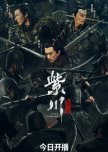
To Ningdom Come.
Eternal Brotherhood or The Three Heroes of Light/光明三杰/Guāngmíng Sān Jié is the first instalment of the live action adaptation of popular fantasy novel Purple River/紫川/Zǐchuān. The narrative opens in the thick of a gripping battle scene in a complex fantasy world and never stops to explain itself. The world building, political dynamics, power structures and character backstories all have to be pieced from the dialogue. It does not help that the plot is heavy with political intrigue and many opaque Machiavelli characters scheme against one another. Casual viewers out for light entertainment will find this storytelling approach frustrating and confusing.Zichuan is a loose coalition of different warlords, noble families and clans in a war torn continent. Yuanzhou is the battlefront, the critical buffer province that stands between Zichuan and their arch enemy Beizu or the North Clan. Food is the scarcest commodity in that strategic battle-torn province that is rich in resources. Power in Zichuan is divided as the Chieftain Zichuan Canxing of the ruling Zichuan family must answer to the Elders Council. The family's grip on power is underpinned by a sworn brotherhood between the previous Chieftain and two powerful commanders; Yang Minghua who secures the capital and Ge Yingxing who secures Yuanzhou. This alliance frays as Yang Minghua is widely expected to rebel. This is the back drop that Zichuan Xiu, foster son of the late Chieftain returns to after a seven year exile in Yuanzhou. The time is ripe for a changing of the guard as the next generation's three heroes Di Lin, Si Yilin and Zichuan Xiu emerge. There is a subtly ominous foreshadowing as they are clearly parallel characters with their predecessors.
One of the keys to understanding this story is that actions speak louder than words and no one says what they really mean; not even when their interests are aligned. This is clearly conveyed in the secret bathhouse scene; the only safe place in the capital for Di Lin, Si Yilin and Zichuan Xiu to speak freely with one another. Of the brothers, Si Yilin is the most reliable and almost blindly loyal one. Di Lin is also quite easy to understand; a ruthless, vehement and dangerous character who cares for very few people. Zhichuan Xiu is a cunning and complex character that hides behind an indifferent and flippant facade. The first arc (~12 episodes) that introduces the three heroes is strong as they work together to put down a rebellion. It is nice to see Yang Xuwen, Liu Yuning and Zhang Mingen work so well together in their first collaboration. Their rapport and humorous banter lightens the portentous, politics heavy tone of the story.
The second arc explores Zichuan Xiu's relationship with the Chieftain Zichuan Canxing and his niece Zichuan Ning. It is anchored by masterful portrayals of two Machiavelli mirror characters who are not quite yet opponents; warily circling and assessing each other. Yang Xuwen holds his own well in this match up against a veteran like Ma Shaohua. Their dialogue is quietly menacing with doublespeak, layers of hidden meaning and traces of irony, and dark humor. This is a rare drama where I feel real genuine fear that the protagonists may be up against a more powerful and possibly smarter antagonist.
I was so busy wishing Ning to Ningdom Come that it took me a long time to realise she is quite an important character. Not only is she next in-line to be Chieftain but Xiu actually cares deeply for her. This role is not well acted to begin with and made worse by the choice of a terrible voice actor. Consequently Ning comes across as little more than an annoying, childish, spoiled and shallow princess that gets too much airtime. In reality, scheming is in Ning's blood and she has an innate shrewdness and strong survival instincts. She fears Canxing and wears the persona he expects as a silly princess only capable of learning the cartoon version of history and nowhere near ready to assume power to allay his paranoia. In their opening scene together, both Ning and Xiu are role playing the pampered princess and her foolish swain. Unlike Yang Xuwen however, the actress is not able to convey any hidden depth to Ning or that there are layers underneath her words. But if you watch her carefully, she is quite clever in how she helps Ka Dan and Si Yilin and she has a far better grasp of the power structures of Zichuan than she lets on. If they had cast an actress better versed at complex roles, her arc would be more enjoyable and how Xiu grew apart from her would be seen as a sad development rather than a cause for widespread rejoicing.
Considering the limited budget they had to work with, the cinematography, camera angles and overall visuals are really nice and it is quite clear that this drama was made with care. Even though the dialogue is extremely well written, it is too unbalanced and too much plot movement happens via exposition; making battlefront developments hard to follow. The too few action scenes that occur mostly at the beginning and at the end are exciting and very well choreographed. Even the CGI is not heavy handed and is actually really nice.
I find it really difficult to rate this drama at this point because it actually ends in the middle of an arc and is thus unfinished. Even though it ends with a superb line, it does not change the fact that this is not only unfinished but also sloppy enough to not even close the Lei Hong arc. The production's two fatal flaws are not making the world building accessible and in mis-casting Ning. Nonetheless, I really enjoyed this drama and am going to temporarily rate it 8.0/10.0. I will revise up my overall rating for the Zichuan series if the second instalment The King of Light/之光明王/Zhī Guāngmíng Wáng wraps everything up well. I think a strong case can be made to wait to watch this in its entirety when the second instalment airs.
Considerați utilă această recenzie?

The Dark Side of the Moon.
This drama is about how a power couple that is well matched in terms of cunning, ambition and capability scale the upper echelons of banking and finance during 1930s Shanghai. The narrative vividly captures the wild, morally ambiguous, highly speculative, wheeling and dealing nature of the mafia dominated banking and finance industries during that early period of industrialisation.Cheng Yizhi is a scrappy, enterprising, self educated young orphan with a knack for numbers and finance who is raised by a kindly shopkeeper. He starts out in a lowly position at a bank but his talent propels his rapid advancement to become the protege of banking magnate Huang Ruhong. Wu Lizi is the pampered daughter of a distinguished banker whose world falls apart when her father is framed and commits suicide. Hell bent on revenge, she marries Yizhi and ruthlessly uses his access to banking circles to investigate her father's downfall. Mutual lack of communication and a terrible, irreversible decision by Lizi ruins their marriage but leads to a very rewarding business partnership where they build a bank together.
Wu Lizi is one of the most selfish, devious, manipulative, ruthless and utterly charming female protagonists I have come across. It is such a treat to get complex and fascinating female characters like Lizi. That is why I kept watching this even though at one point I was enraged and disappointed to the point of almost dropping. I still don't like how they wrote Lizi to lash out so viciously and vindictively with such heavy consequences but I am glad I kept going because she really moved me with her stoic remorse and acceptance later on. Even though there were some rough edges to Cai Weijing's performance, overall she is tough, willful, curiously vulnerable and so charismatic that I could literally see how she tied Yizhi, Charlie and Xu Du up into knots emotionally.
Zhang Xincheng delivered a most excellent performance in this drama as Cheng Yizhi, a cynical character that well understands the dark side of the moon due to his upbringing on the rough side of town. So he is the ultimate nemesis of dark characters like Huang Ruhong because he can get into their heads and narrowly manages to stay one step head of them. In sharp contrast, he seeks the light in all of his dealings and finances some of the most promising industrialists of the day. At the onset Yizhi goes toe to toe with crooked businessmen and corrupt politicians with equally scheming and wily tactics. But as the story advances and his dark secrets are revealed, the character is whitewashed and becomes too perfect, so understanding with such shiny plated plot armor that I had to roll my eyes. I needed more flaws or to see him be a little bit petty or selfish and to play dirty sometimes. Instead Charlie, a far more interesting and lovable character rises to the occasion to do all the slightly shady things that need to be done in order to stymie their unscrupulous rivals. Nonetheless the lead couple has superb chemistry and the way their relationship blossoms from mistrust and suspicion into an incredible partnership on multiple levels is one of the drama's strengths.
The business subplots are quite interesting, well written and the financial concepts are kept at a simple enough level for laymen. The characters however are less well written and notably Lizi, is not consistently written. For such a smart character she does some retarded things that can only be put down to sloppy writing. Huang Ruhong's somewhat creepy and unfathomable hard on for Yizhe is also unconvincing and not in character for the leader of the criminal underworld. Indeed the true love triangle in this drama is the one between Ruhong, Yizhe and Lizi. This was such a promising antagonist at the start but gets sidelined as the ending arc digresses into yet another patriotic fight the Japanese invaders plot. I would have preferred to see a more satisfying cat and mouse takedown of this smart antagonist play out properly. Towards the later episodes, many key characters are gratuitously killed off to squeeze out the obligatory tears expected of a Republican period drama. This backfires as I only felt very sad for two of the deaths which only highlights that the other characters were two dimensional ones that I never got invested in.
There are many enjoyable and unique aspects to this drama that make it worth watching even though it falls down on messy plot, sloppy character writing and a lame ending arc. Charlie was my favorite character and his wit, style and wisdom saved the show. Overall this is just a 7.5 for me despite strong acting by the leads. And MVP Charlie (Wang Zijian).
Considerați utilă această recenzie?
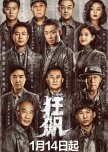
The road to perdition.
To put it simply, The Knockout knocks it out of the park with its audacious portrayal of an anti-villain as the main protagonist. Spanning twenty years, it is a masterful account of how a struggling everyman insidiously strays onto the road to perdition. The stage is set brilliantly from the get-go to manipulate us into sympathizing with a character who does terrible things. We are blinded by their humanity and blame the system for failing them, forcing the oppressed to become the oppressor.Gao Qiqiang starts out as a humble fishmonger doing his best to raise his younger brother and sister. When thugs threaten their livelihood, he stands up to them but is framed and arrested. An upstanding young officer An Xi suspects he was bullied, books the case leniently, and tries to keep his tormentors at bay. Ironically with small acts of kindness, An Xi empowers Gao Giqiang and propels him in unimaginable ways. The complex and sincere bond of empathy and indebtedness that is forged between the two men is the linchpin of this story. Their most pivotal character turning points and moments of truth play out on the neutral ground of a humble noodle shop. where much is revealed with few words.
It is clear from the outpouring of accolades that Gao Qiqiang is an iconic portrayal that put the hitherto under-appreciated Zhang Songwen on the map. Gao Qiqiang is a visionary mastermind who draws inspiration from Sun Tzu's Art of War. He is dangerously underestimated because of his amicable facade and his disarming affection for and vulnerability with those he cares for. The way he embraces fashion to please his wife to how he willfully blinds himself to his brother's weaknesses is both touching and relatable. When crossed, threatened, or betrayed, he is unforgiving and cruel to the point of depravity - no one is safe from him. He is chillingly ruthless and implacable when it comes to imposing his own brand of loyalty and justice. Like any good sociopath he oozes regret but in truth has no qualms about sacrificing his generals. He "makes it right" by caring for their families sincerely and with deep gratitude. He is bound by a very misguided code; one that is ruthless and amoral yet oddly authentic and honorable. Zhang Songwen embodies this character so well that some believe he is not acting and insist he should be at least investigated, if not locked up.
An Xi is both Gao Qiqiang's savior and his nemesis. More than anything, he is his biggest victim. This character makes me sad and mad. He is well meaning and does the right thing with all the wrong outcomes. Zhang Yi was reluctant to accept the role of An Xi, feeling he wasn't a good fit and wouldn't able to pull it off. But Zhang Songwen's Gao Qiqiang would not be so compelling without Zhang Yi's An Xi. It is their incredible rapport and ability to silently communicate that makes the small screen seem huge. Zhang Yi's expressive gaze and more subtle style is the perfect foil for Zhang Songwen's flamboyance and charisma. While I admired and sympathised with Gao Qiqiang, An Xi is the one that often moved me to tears. His speaking eyes frequently implore Gao Qiqiang to be a good man and convey bottomless dejection that gives lie to the goofy smiles he flashes at Meng Yu. The aging of characters over three distinct time arcs across twenty years is rarely captured as well as it is here. But it is Zhang Yi that simply nails this part - he is wary and tired but not quite beaten; the righteous flame in his eyes are dimmed but at the core still burns hot.
This drama is impeccably cast and is a who's who list of China's best actors, all of whom deliver immersive performances. The director's incisive lens meticulously peels back the many layers of the multi-faceted characters and their intricate relationships. The female characters are written to be strong and impactful beyond their screen time. Li Yitong really takes her acting to another level as Meng Yu; it is by far her strongest, most memorable role to date. Her screen chemistry with Zhang Yi is unexpected and endearing. And then there is Gao Ye's simply sensational Chen Shuting, the ultimate gangster's moll - cool, stylish and fearless. The way she menaces the wits out of Gao Qiqiang is one of the drama's highlights for me. There is a lot more on-screen violence in this drama than I expected. While the worst of it takes place off-screen, it is so well staged that it is more visceral and blood thirsty in my overactive imagination.
The rich plot builds to a shocking, unpredictable and devastating climax about a third of the way through. Then it loses momentum and in the final ten episodes it limps toward a predictable ending. This is somewhat to be expected as this was produced in partnership with the state, the nationalist message is inevitable.I really did not care about the party's anti corruption task force and yawned through their heroic sweep through Jinghai City to weed out the endemic corruption that had seeped into the cracks at every level of the bureaucracy. It is clear that there were some cuts and at least one character is whitewashed but I don't think it changes the gist of the final outcome. The final confrontation between Gao Qiqiang and An Xi saves the entire arc and there were enough characters I cared about including Meng Yu that it was still overall a decent arc. All considered, I am not as dismayed by the way this ends as others are. The fact that the government always wins is a foregone conclusion and not a spoiler in any crime and/or corruption themed Chinese drama. But in this case, I don't really think it shines that great of a light on "the good guys". I mean where were they for twenty years? And I am not sure the "good guys" win here. Poor An Xi is definitely is not a winner; in fact no one wins. Indeed audiences overwhelmingly empathise with Gao Qiqiang. Thus this is actually a very dark crime story with a surreptitiously bold and critical ending.
This spectacular crime thriller is a must watch. The first 30 episodes feel like a tour de force that can easily be rated 9.0/9.5. The rest are more at the 8.0 level so 9.0 feels about right for my final rating.
Considerați utilă această recenzie?

To Catch a Thief
Cui Xingzhou, the mighty Prince Huaiyang has been trying to catch a thief, the slippery bandit Lu Wen for some time. He stumbles upon a comatose Liu Mintang and like all princes, he simply cannot let sleeping beauties lie. Convinced she must be the beloved mistress of his nemesis, he rescues her intending to use her as bait. Conveniently, she has amnesia and mistakes him for her husband ! Thus this cold and formidable fief lord awkwardly assumes the persona of an indolent and not terribly successful merchant who dotes on his wife. Miantang's true colors emerge as a determined and capable business woman with an scary knack for turning hairpins into lethal weapons. It seems Xingzhou may have bitten off more than he can chew as it becomes clear Miantang has secrets and hidden depths that she herself barely remembers. Meanwhile his elaborate charade and lies keep snowballing until eventually half the town is complicit. What ensues is the kind of comedy of errors that arises when hero syndrome meets analysis paralysis. Complicating matters, her memory and past life catches up with them just as they both become invested in their fake domestic bliss and fall for each other. How will they to resolve their past grievances and make a life together as their true selves?What I appreciate most about this drama is both Xingzhou and Miantang are grey characters who have agency if not free will. They are well matched in terms of cunning, intellect, ability and ruthlessness. I enjoyed watching them work against each other almost as much as I enjoyed their working together. As someone who loves dark characters, I wish they toned down the comedy and dived into a darker and more passionate exploration of their undeniable chemistry and stunning visuals. While Zhang Wanyi is an exceptional character actor, comedy is not his forte. His expressions and delivery is almost too textbook perfect and his comedic timing lacks spontaneity. He pauses for too long to let the punchline sink in when he should keep going as the audience already got it and is waiting for the next joke. The humor is straightforward and not that sophisticated so it needs to unfold at a fast pace to hold audience interest. To speed things along, I watched most of this drama at 1.25 speed, something I almost never do. The comedy also masks that Xingzhou is quite a dark character that does controversial things to Miantang, manipulating her to the point of gaslighting. Zhang Wanyi could have pulled off a darker portrayal in an absolutely riveting and charismatic way so that is an opportunity missed. Nonetheless, he is compelling as a powerful and complicated fief lord who to his chagrin, falls in love with the enemy; a most unlikely and unsuitable woman.
Wang Churan is a vivid beauty and her comedic timing is more instinctive than Zhang Wanyi's. Her portrayal of the amnesiac Miantang is natural and charming. However, her character transitions after Miantang recovers her memory could be better written and portrayed. Part of the problem is in the novel, Xingzhou crosses some lines that he does not cross in the drama. Thus Miantang's rage and sense of betrayal is disproportionate to what actually happened. The stabbing scene was undeserved and this kind of violence is off-putting and has no place in a story where the couple is not breaking up for good. Beyond that, Miantang is a worldly character, a rebel who was on fairly intimate terms with Ziyu without much regard for her reputation. She played in the same sandbox with the big boys so it was baffling to see her go so full on girl angry at Xingzhou, who was just doing his job. These are mostly writing issues but there is also something lacking in the acting. Wang Churan was not able to reflect the character's evolution and approached it as if Miantang became a different person. There are unspoken ways to convey that at the core, Mianting is still the same Miantang; that the person Xingzhou fell for is still there. A more experienced actress would have used micro-expressions and subtle character traits to achieve this. And then just as inexplicably after the angst drags on long enough, she becomes sweet and forgiving domestic Miantang again! Since Wang Churan is new to lead roles and she is so lovely, I am happy to be forgiving. Nonetheless this diminishes Xingzhou as a character and made him appear no less a foolish, love brain than Ziyu. I am also left with a nagging concern that Miantang may be bipolar!
Even though this drama has some interesting and unique ideas and is refreshing in the way women are portrayed, I found it to be a bland watch overall. Despite some fun and memorable moments, the plot arcs are shallow and rehash well known battle for the throne tropes. Which is fine if the character arcs are well done but while the main characters are complex, they are dumbed down by the comedic focus. Miantang is inconsistently written; she starts out as a strong and independent woman who doesn't need to get married to have a fulfilling life. She abandons Ziyu's cause without a backward glance, abandons her revenge arc after a half-hearted attempt to infiltrate the palace, takes over an escort business before deciding she liked playing house best. At the end, I couldn't figure out what she was about. The character I enjoyed best turned out to be Shi Xueji. She finds so much joy in life's simple pleasures, is resilient and her quiet wisdom and dignity impressed me as much as Miantang's inconsistencies did not. I loved how the actress conveyed a layered character with deep and moving emotions via subtle expressions and a gentle smile that radiates with unbridled happiness. I also quite enjoyed Ziyu's character but the second couple was coma inducing and completely irrelevant to the story.
The drama finishes strongly at the climax in both the conspiracy and character arc but doesn't change the fact that despite its fresh premise it did not have enough substance to support 40 episodes. It would have been a more enjoyable watch at a tight 24 episodes or if they had engaged in a deeper and darker exploration of the characters. Nonetheless if you don't over analyse, it is very entertaining as a light romantic watch with phenomenal acting by Zhang Wanyi. My rating is 8/10 but I can see romance fans rating it a bit higher.
Considerați utilă această recenzie?
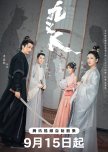
Those who seek revenge dig two graves.
This is a heartbreaking and sobering revenge drama about an ancient Me Too movenment by nine commoners seeking justice. The two main protagonists, Rulan and Meng Wan are apprentices at Yanyu Tower, whose exquisite embroidery are prized by the imperial palace. Underneath his polished and elegant facade, Yanyu Tower's proprietor and master embroiderer Wu Lian is the worst kind of predator; one who uses his power and privilege to repeatedly manipulate and abuse the young women working for him. When Rulan has the audacity and tenacity to seek legal redress, most including her bestie Meng Wan hesitate to help her; knowing how stacked the system is against them. Ultimately her plight and her conviction inspires nine people to devote their entire reason for existence to taking Wu Lian down and obtaining justice for Rulan and in some cases themselves. There are no fairytales in this drama; their stories are utterly devastating; alternately moving me to tears and making my teeth clench and my blood boil.This drama is not for the faint hearted and comes with a ton of trigger warnings. It is ruthless and brutal in terms of its scathing depiction of the unbalanced power dynamics between the powerful and the powerless. It convincingly articulates why regardless of consequences, Rulan, Meng Wan and their friends decide to take a stand against a clever, powerful and ruthless opponent. Their efforts are stymied at almost every turn and many of them pay the dear cost of justice. Wu Lian is almost too smart a villain and too well resourced. It is dismaying to see these nine avengers fall for the same traps over and over. In desperation, some of them take unnecessary risks and make terrible sacrifices with scant payoff in their attempt to gather enough evidence to indict him.
This is a large cast with consequential roles that deliver all around strong performances. Hu Yixuan's portrayal of Rulan's disillusionment, agony, bravery and forlorn quest for justice is harrowing, piteous and ultimately tragic. Wu Qian also impresses as the icily soft spoken, resolute avenging angel and mastermind of the revenge plot. As for Wu Lian, it is rare to encounter such an intelligent and downright despicable villain, masterfully acted by Qiao Zhenyu. All of the support roles come together well to paint a picture of common people from all walks of life with dreams and goals that get disrupted as they come together to get justice. The thief Li Chunfeng and the embroideress Jue Ming charmed and moved me into rooting for them most.
This kind of drama that tackles such a difficult subject matter is unlikely to appeal broad audiences. It is well executed for the most part but tends to be unnecessarily melodramatic in the later arcs. The villain origin backstory left me unmoved and is not convincing. I would expect Wu Lian's father's concubine to have impacted him in a more positive way. While this story ends in a realistic way, I am not satisfied. Wu Lian's enablers who covered for him repeatedly get off way too lightly. Finally the way this wraps up sends too strong a message that those who seek revenge dig two graves. Revenge becomes their sole purpose and end game to the extent that I wonder - did they really win? There is just too much collateral damage and sacrifice even though Humpty Dumpty can not be put together again. Maybe it would have been better to just live well. I needed to see at least one of the victims recover from this and go on to have a good life. The final What If episode 25 made me feel worse not better. I struggle with how to rate this. As much as I applaud the topic, the acting and how emotionally invested I got in the story, it left me with a hollow feeling after the ending arcs. It is still a good, thought provoking watch but I can only rate this a 7.5/10.0.
Considerați utilă această recenzie?

Royal Nirvana Special
27 oamenii au considerat această recenzie utilă
Its in their nature.
I almost didn't watch this. Although many plot threads were left unfinished, I could accept the way they left things for the main protagonists. Why not leave well enough alone? Because I still wanted to know if how things play out with Gu Fengan, Prince Zhao and Xu Changping and who does not want to see more sweet moments between Wenxi and Dingquan?There are some unexplained time gaps but these last 12 episodes are surprisingly well edited and neatly tie up all of the remaining important plot threads. What I like best is that the villain is really good, probably the best one in the entire story and he is taken down by the person he least expects. The plot is also not too convoluted nor overly mired in excessive detail so I found it easier to follow. I am also quite impressed with Zheng Yicheng's portrayal of the more mature Gu Fengan - this promising young actor needs to take on more complicated roles like this.
What remains painful is the relationship between the crown prince and the emperor - it evolves and yet is still the same. Its like watching an unstoppable force meet an immovable object. Neither can help themselves, it is in their nature. The crown prince is an amazing, uncompromising idealist with a big heart and the best of intentions but he is also a most unsuitable person for the job. He is the one person in the entire story with no free will. Everyone, including his soul mate Wenxi tries to force his hand. The outcome is inevitable and frankly, a relief.
I am glad that with this, I watched the show in its entirety. If you have already watched the first 60 episodes, I don't need to remind you that this is a beautifully written but heavy, depressing story. It is a strong finish, I give it a 9.0 although if I have to rate the drama in its entirety it is still an 8.5.
Considerați utilă această recenzie?

Nirvana in Fire 2: The Wind Blows in Chang Lin
27 oamenii au considerat această recenzie utilă
Closure
While NIF2 works as a superb standalone story, it is best appreciated if watched after NIF. Also be aware some of my comments may be spoilers for NIF so best not to read this if you haven't watched it.NIF2 is the story of the changing fortunes of the Changlin family as together with the Liang empire, they navigate a changing of the guard. While the story skips a generation, the ghost of Lin Shu "haunts" the drama. After all, the powerful Changlin Army is the legacy Prince Jing created in Mei Changsu/Lin Shu's memory. Xiao Tingsheng, the now elderly Prince of Changlin instills in his family the same moral values, duty, honor and loyalty that were innate to Prince Jing and Lin Shu. His sons Xiao Pingzhang and Xiao Pingjing grow up with and share a deep bond beyond blood ties with their imperial peers, especially the Crown Prince and their cousin Xiao Yuanqi. Their proximity to the throne and unbalanced power in the court is feared and envied by many. This sets the stage for political plots and intrigue at the highest levels of the court that pose many challenges for the Changlin family. This brings the free spirited and fun loving Pingjing back from the famed Langya hall to aid his more responsible elder brother Pingzhang, the heir who already shares their father's duties.
In NIF, we can only imagine what young Lin Shu's life was like. NIF2 invites us to experience being in the bosom of a close and loving family at the epicenter of power in the empire. We laugh and we cry with them, their friends are our friends, their foes our enemies, their hopes our hopes and we feel the pain of their losses in an acute and very real way. The script-writing and plot in this drama is deep and masterful in a way that rivals that of NIF. While political plotting, revenge, justice, loyalty, morality, duty and envy are still strong themes, it dives more deeply into relationships between sovereign and subject, parent and child, husband and wife and siblings and cousins while exploring the fine line between good and evil and nature vs nurture. Unlike NIF, the story does not revolve around one core character but a number of key characters. Like NIF there are many grey characters and even the good characters are very realistically written with their own strengths and flaws. These lead characters evolve over time as the story-line spans a generation shift and explores how these characters deal with change. The second half of the drama focuses on the younger generation and this is where weakness in the acting emerged as these demanding transitions are played out by younger and less experienced actors. That said, overall the cast was very strong and well populated with many veteran actors.
Newcomer Liu Haoran's Xiao Pingjing was stellarly portrayed from start to finish. He managed to "grow up" from the immature, playful, outspoken, impetuous and slightly irresponsible younger son to be a skilled pugilist, brilliant general and military tactician, the rising star of the Changlin family. This actor immediately conveyed that Pingjing must be what a young Lin Shu (whom we never met in NIF) would have been like. He is the young actor to watch coming out of NIF2. Sadly his love interest Lin Xi was played by a limited and forgettable young actress. Lin Xi's father was killed before she was born so she is an aloof character, a talented and capable lady doctor. She had to make a terrible, controversial and life altering decision in this drama. This is an awesome part that a better actress could have killed. This one wore a perpetually tragic expression and when pressed to defend her decision she overacted, wailing in a completely out of character way. There was no chemistry between Pingjing and Lin Xi and as a couple, they were not convincing. Pingzhang and his wife Meng Qianxue on the other hand were touchingly in sync with each other. Fortunately this is not a love story although there is more romance than NIF. Both female leads were strong and well written characters but only Meng Qianxue's role was well acted.
In the second half of the drama, cousin Xiao Yuanqi also comes of age, clawing his way up despite the disgrace his father (the youngest son of Prince JIng) brought on to their branch of the family. Yuanqi is a chameleon and the most interesting, complex and empathetic character in the entire drama. To be fair it is a challenging role, one that actor Wu Haochen was not up to. While his performance was technically good, it was also pedestrian and boring. He simply lacks onscreen presence and charisma. I didn't want to watch him and would either tune out or tune into whoever he was sharing the screen with. This was too critical a role for them to have miscast so badly. The character itself was exceedingly well developed, it just didn't come to life in the right way. It is why for me this drama is not a perfect 10 even though the script, plot and story-line can hold its own against NIF.
NIF broke my heart because even though Lin Shu/Mei Changsu got his justice, it was his final act. What he lost could never be recovered. I was inconsolable for a long time. Watching NIF2 was cathartic because NIF2 shows us that his legacy and everything he stood for lives on in all the lives he touched. And despite its own tragic moments, in NIF2 we get to imagine that maybe Lin Shu came back to fulfill his final promise. That gave me the closure I badly needed.
Considerați utilă această recenzie?

The Legend of Xiao Chuo
51 oamenii au considerat această recenzie utilă
One step forward for mankind and two giant steps backwards for womankind.
This romanticized account of the life story of Xiao Yanyan, the accomplished Khitan Empress Chengtian (953-1009), gives voice to folk or unofficial history of her relationship with Han Derang. Wild history of their love affair survived over a thousand years and continues to fire the imagination of Chinese historians today.Please be aware of mild spoilers ahead (unless you already know the history).
It is known that Xiao Yanyan, was once engaged to Han Derang, who was from an elite Han Chinese family loyal to the Khitan rulers. According to the drama (which is based on a novel), her father chancellor Xiao Siwen and Han Derang help Mingyi (Emperor Jingzong) ascend the throne. Mingyi is sickly and his hold onto power is thus unstable; many branches of the royal family vie for the throne. Mingyi insists on marrying Yanyan so that like both his main rivals who married Yanyan's older sisters, his wife is also of royal bloodline. This kind of ill fated romance has limited appeal to most romance watchers and is an unnecessary digression for most historical or political drama buffs.
Although I was primarily interested in the history, Tang Yan and Dou Xiao's portrayal of the young lovebirds captured my heart and I was devastated by their forced separation. But alas their chemistry fizzles out later on in the drama and leaves me unconvinced that they are soul mates whose love is as deep or as epic as folk history suggests. At face, the bare facts are tantalizing - he shores up her regency over her young son Emperor Shengzong; is her trusted confidante and is highly ranked in her court; they may even have married and had a child together and; he was likely buried besides her. But in their more mature personas, both characters just seem sad, tired and lonely and not long lost soul mates who finally have their moment in the sun. It does not help that Tang Yan appears to have an easier, more natural chemistry with Jing Chao's Mingyi. To make matters worse, there are no nuances or subtleties in Yanyan's interactions with Mingyi and Derang that suggests they mean different things to her, that her relationship with and affection for each of them is not the same.
Mingyi is the most layered, complex and interesting character in this drama and probably one of the best grey characters I have seen this year. Although I resent his manipulation, his selfishness, his obscene sense of entitlement and his disingenuous excuses for doing terrible things, I also grudgingly empathized with him and the monumental task in front of him. Jing Chao really delivers one of the most convincing portrayals of a sociopath emperor who has the audacity to steal his best friend's fiancé and yet demands and expects them to protect his legacy. Unfortunately although she delivers a few good scenes, Tang Yan fails to evoke a strong and powerful empress who can rule alongside and then after the emperor. She cannot hold onto her strong moments, just defaults back to her comfort zone of a very beautiful and feminine woman that is to be rescued and protected. Her attempts at gravitas just results in a cold, aloof empress that doesn't allow any sparks to fly; even when she is free to be with the alleged love of her life. To be fair Tang Yan was pregnant during the shooting and that put limits on her ability to do the more physically challenging scenes but she still did not have to be written to be so mopey and passive aggressive.
The other magnificently and effortless acted role is Sheh Szeman's Xiao Hunian who is everything and more of what I imagined Yanyan would be. Her portrayal of a strong, yet feminine woman who bows to duty without wallowing in self pity; who is a fierce, strategic warrior that stands up to the menacing Yansage; who does as she pleases and shows her displeasure as effectively in words as in action puts Tang Yan's meek and insipid performance to shame. When Hunian tells Han Derang that it was just a twist of fate, else she would be just as great an empress, that resonates because art imitates life; a younger Sheh Szeman would have conveyed an unforgettable Xiao Yanyan. I did not approve of how the writing undermines Hunian in the final arc - even though Sheh Szeman got more airtime and had some awesome scenes, it was just not the right thing to do to the character.
While this drama as a whole does not live up to my expectations, I found many parts of it to be riveting. The power struggles and the battle for the throne are well written and shot but the story peaks at the Yansage arc. The battle footage and strategies used to route the enemy in this arc are bloodthirsty and exciting but is too early for the climax of the drama. To some extent that cannot be helped as it is the correct sequence historically. That said, after the Yansage arc, the focus of the story should shift from internal strife to external strife rather than focus on a series of much weaker, rather pathetic attempts at coups by the least interesting characters in the drama. It does little more than to drive home how hard it is for a widowed empress to hold on to the throne as regent without a strong military backer. It does highlight Han Derang's contributions and achievements as the unsung hero and the true power behind the Liao throne.
To me this is a 7.5/8.0 but I am going with 7.5 because I expected to watch a drama about a woman warrior who chose her country over her true love and then went on to make Liao great so that her sacrifice would be worth something. Instead, I may as well have watched her get her revenge on Mingyi by doing nothing besides get fat on sweet cakes and having flings with stable boys. But I learned many things about Liao/Khitan culture, including that Khitan women were very equal and progressive - they can get divorced, remarry if widowed, lead armies, hold positions and even rule in court. Which is really ironic because Mingyi's legacy Han reforms that were among Yanyan and Han Derang's greatest achievements basically Sinicized the nomadic Liao people to their vast benefit in terms of agriculture, language, culture and administrative and legal systems. But it also set Liao women back thousands of years in terms of the status and freedom. So what our warrior empress really achieved was one step forwards for mankind and two giant steps backwards for womankind. Maybe Tang Yan's portrayal wasn't that far off...
Considerați utilă această recenzie?
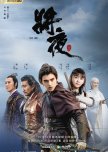
Beware of false prophets.
Ever Night is an epic fantasy adventure hit set in a mystical, ancient world where the balance of power between rival kingdoms is maintained with the aid of powerful warlords and cultivator sects. The vivid stunning palette is infused with an ominous sense of dark prophecy. The soothsayers warn that the child of darkness will bring an ice age or ever night and chaos to the world.The main protagonist Ning Que makes an thrilling debut as a lethal, almost ferally vicious warrior in a ferocious, spectacular desert ambush. This opening sets the tone for some of the most exhilarating and well choreographed fight scenes that Chinese drama has to offer. The drama is visually spectacular and delivers on the hype on many fronts, especially in terms of its movie quality production values. The sweeping breadth of the story can be overwhelming in the sheer number of characters representing different kingdoms and sects that makes the story appear more complicated than it really is. This is really the story of Ning Que (and by extension Sang Sang's) quest for revenge that sets him on an epic journey to become one of the strongest cultivators in Haotian.
Ning Que is an anti-hero. He is ruthless, cunning, manipulative and can be quite dishonourable. While at at times Chen Feiyu's acting could do with some polishing, he is superbly cast as Ning Que. He emanates that simmering resentment and burning thirst for vengeance that propels Ning Que to prevail against overwhelming odds and superior foes. With his lithe powerful build, his combat scenes are bloodthirsty and violent and his facial expressions are vicious, almost feral. Ning Que's arch-rival the glorious Prince Longqing is an interesting mirror character on a parallel path that makes different choices at important milestones along the way. What is quite remarkable about this story is there are no outright villains. The world they exist in is cruel and fraught with peril and conflict among competing interests. Thus both the antagonists and protagonists have to do ruthless, even terrible things to survive.
Unlike others, I am not troubled by the relationship between Sang Sang and Ning Que. They have no blood ties, they are simply found family and have a complex and multi-layered relationship that is likely predestined. In fact, I think it is inevitable where the relationship must go. As much as I enjoy their undeniable chemistry and clear bond immensely, to me the real issue is that Chen Feiyu and Song Yiren should never be cast together in a romantic capacity. Chen Feiyu is exceptionally tall and Song Yiren is exceptionally petite. Her youthful features and small size makes her look like a child next to him. This visual imprint is so strong it is practically impossible to imagine them as a couple. Their relationship in Season 1 remains platonic and is not troubling but it is a good thing that Wang Hedi replaces Chen Feiyu as Ning Que for Season 2.
In terms of storytelling, there are issues with pacing and the breadth and depth of the character and world building is perhaps overly ambitious in scale. Even though I love how there are different schools of cultivation and cultivators are able to gain immense power via different theologies and practices, I find the excessive pontification and philosophical discourses mind numbingly boring. That said, I appreciate the ultimate irony of how many powerful cultivators are ruled by superstition and fear of ever night or the child of darkness. While the worthy ruler and the true wise men know to beware of false prophets. The political arcs are not that interesting and Princess Li Yu and her brother don't add to the plot. They just take up space and despite all the screen time, this and several other sub plots like the inner politics of the West Shrine and Yan State go absolutely nowhere. Obviously this lays the back story for multiple (?) seasons but unfortunately none of these sub plots and characters are interesting enough to make me want know what happens to them.
Despite the digressions and morass in the middle, the drama builds towards a very strong ending. I was truly moved by Ning Que's speech when he finally confronts his family's killer and I was really impressed by Chen Yufei's acting in that moment. "Why does it always have to be a prince?" is one of the best, most memorable lines from this show. The build up in tension, that sense of dread and hope into the ending confrontation is superb. The final fight scene is epic, full of surprises, utterly savage, desperate, exhilarating. It was everything I didn't even know I was craving for. Even the CGI is amazing.
I thoroughly enjoyed many aspects of this heroic saga and I am happy to recommend this as a not to be missed drama for action and adventure buffs. But unfortunately there are many parts of it that I did not enjoy and I feel strongly that the production over indulged in laying the backstory for many subplots that only play out in subsequent seasons. I am going to go with an 8.5 because the production values and fight scenes are exceptional. Going purely on storytelling alone however, this is at best an 8.0.
Considerați utilă această recenzie?
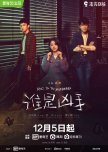
Light on Series: Who is the Murderer
22 oamenii au considerat această recenzie utilă
Cop out.
Despite a strong start, Who is the Murderer? deflates into yet another over-hyped and ultimately mediocre production in the 2021 Mist Theatre (soon to be known as Miss Theatre) lineup. This kind of simple and straightforward plot around the hunt for a long hidden serial killer relies heavily on good execution to impress. I don't know if it is an indictment of the competence of the Chinese police force but practically every Chinese crime thriller revolves around a stone cold case and the lamentably long road to justice.The lives of the three main characters collide when young Xiamu's foster mother is murdered by a serial killer. A fatal moment of weakness by then newbie cop Leng Xiaobing enables the murderer to escape with collateral damage. Teenage Shen Yu's father disappears without a trace after appearing near the scene of the crime. Seventeen years later, the revival of this cold case entangles Shen Yu, Xia Mu and Xiaobing, united by the scars from the past yet divided by different and at times conflicting agendas. Without a doubt all three leads deliver stellar performances as characters who all experience a shattering personal loss from this common event which shapes them in very different ways. Overall I found Xiao Yang's portrayal of the gruffly amiable but subtly guilt ridden Leng Xiaobing most natural and convincing. While both Zhao Liying and Dong Zijian delivered intense and very well acted portrayals of Shen Yu and Xia Mu, they erred on the melodramatic side with excessive posing.
One of the big issues with this drama is that the suspense does not arise from the plot itself but is heavily contrived, induced by background music that accompanies angsty and heavy dark posturing by both Xia Mu and Shen Yu that goes absolutely nowhere. While compellingly acted Xia Mu's PTSD is out of proportion to the trauma he experienced and after a lot of build up and suggestive behavior, this character just gets side-lined and he is bafflingly short changed in the final showdown even though he is on the scene. While Zhao Liying's impressive portrayal of the cold, creepily inscrutable and sociopathic Shen Yu exceeded my expectations, the plot again simply fails to rise to the occasion when it comes to her story either even though she hogs the final confrontation. At the end, I feel both characters led me on a merry chase, teasing with suggestive dialogues and actions that ultimately never fully plays out. It is very frustrating because this setup and the story could have gone down many more intriguing paths with thrilling and shocking outcomes but after setting it all up, the writer pulls a much bigger cop out on us than Xiaobing's pivotal gun shy moment.
Reminiscent of The Pavilion, the plot gets hijacked by character explorations that not only don't advance the plot, they distract from it with artificially induced suspense. This led to my greatest disappointment in the way the murderer is introduced and revealed. It completely violates the unspoken bargain of giving the viewer a sporting chance of identifying the murderer. The murderer falls far short of that lurking evil presence that creates an aura of danger around the main characters and their motive is a big yawn. This does not by any stretch of the imagination qualify as a whodunit, it is at best literally a spoiler homonym of a whodidit. Bottom line, this is little more than a very unremarkable investigative crime thriller so if you were looking forward to playing armchair detective, look elsewhere. The further extension of the mundane plot with non substantive filler episodes that introduce unnecessary characters further irritated me when I would have preferred to better understand what happened to Xia Mu's foster mother as well as Shen Yu's father. The fact that the only character I cared about was Xiaobing's (hot cop) friend at the beginning says it all about how big a fail this is.
I can only rate this a generous 7.0 out of 10. I waited to write this review because right after the ending, my very incensed mother was leaning on me not to rate this better than a 5.0.
Considerați utilă această recenzie?

Love and Destiny
103 oamenii au considerat această recenzie utilă
Aged to perfection.
Since Love and Destiny was produced by the same team and resides in the same world, comparisons to TMOPB are inevitable. Pleasingly, the only connection is that it takes place earlier in the same 3L3W universe. This is efficient as less time is wasted on world building and explaining the tribes, hierarchies, time and other conventions. The story-line sticks to the 3L3W formula of an unforgettable love story that spans three lives and three realms. While TMOPB was an intensely passionate love story, this has more of a romantic comedy flavor. This is the story of a pure heart-ed young fairy who falls in love with the powerful and much older God of War. This relationship dynamic sets up for a different love story that again succeeds in delighting and captivating in a way that is now becoming a 3L3W brand.The plot is common for this genre (save the world or save the girl) and is this drama's biggest weakness. Those familiar with the director may observe the backstory of some leading characters (Jiu Chen, Ling Xi and Jing Xiu) were inspired by Journey of Flower - (Bai Zhihua, Hua Qiangu and Dongfang). That said, L&D is neither another TMOPB, nor JOF but a delightful story that stands on its own, albeit with a few cliche tropes. The three main arcs could have been better balanced - the first two took too long and did not leave much time for the final, most satisfying arc. There were too many (well executed) comedic fillers in this drama. This made it feel like "nothing's happening" or the relationship progressed too slowly.
The weak plot was compensated for by superb acting by the main leads. Veteran actors Chang Chen (Jiu Chen) and Ni Ni (Ling Xi) were perfectly matched. They are both gorgeous actors whose emotions and facial expressions transform and make them compelling in their appeal. The role of Jiu Chen was made for a Chang Chen that is aged to perfection - his sculpted bone structure and fierce expression exudes the aura of a stoic, mature and powerful God of War. Any suggestion that some young idol actor could have pulled this off is ridiculous. Jiu Chen is a formidable character that wears the lonely responsibility of keeping the realms safe. He moves mountains to force a win-win in his terrible conflict between duty and love. His instinct is to protect Ling Xi, to the fault of hiding the truth from her. He is alternately stern and helplessly indulgent with her. His impassive expression softens, he even smiles and becomes open and vulnerable only with Ling Xi. He is touchingly candid and unguarded when he confesses his feelings to her. With insight beyond her youth, Ling Xi recognizes the loneliness and burden inherent in Jiu Chen's role. She captivates him with her spell-blinding smile and mischievous antics; he is touched by her devotion and inept attempts to aid him. As their feelings grow, you can feel the invisible bond of their awareness and affection for each other. Ling Xi's best, most courageous moments are when she makes unbelievable sacrifices in order not to add to Jiu Chen's burdens. Each loves the other more than they love themselves.
In the first arc (20+ episodes), the Ling Xi wakes up Jiu Chen, who had been frozen for 50,000 years after sealing the Demon King. He is suspicious that such a weak fairy could have awakened him and takes her in, ostensibly to care for his health. The guileless and infatuated Ling Xi is delighted and disrupts his household with her comical attempts to entice him. She loses her senses over him and fires up his stone cold heart with her devotion. However, as God of War it is his duty to execute the young fairy with the ability to release the Demon King. Initially I found Ling Xi too subservient; a bird immortal with a bit of a bird brain. Yet Ni Ni's portrayal of Ling Xi was never annoying, indeed I was charmed despite my preference for stronger characters. She won me over when she bravely steps up to protect Jiu Chen and takes responsibility for her own life.
In the second arc (up to episode 50), Ling Xi is reincarnated as a mortal Lin Mo who has to go through three trials. She overcomes many challenges and becomes independent along the way. This is where Jing Xiu emerges as a manipulative, petty and sinister love rival to Jiu Chen. Episodes 30-40 can be skipped - this part was draggy and I struggled to empathize with Jing Xiu. This actor overacted the villain when he is actually supposed to be a grey character - he was so selfish, manipulative and creepy I was irritated at Ling Xi for not being wary of him. There were many unnecessary side characters in this arc that lingers too long on Ling Xi's coming of age. The best moments are between episodes 40-50 where Jiu Chen and Lin Mo fall touchingly in love (again). The final arc was the shortest and the sweetest. Ling Xi becomes a powerful high goddess who forces Jiu Chen to let her share his burdens and they face their enemy together.
The supporting cast was strong and there is a lovely secondary love story between Yun Fung and Qing Yao that is nicely intertwined with the primary. The villains did a decent job being evil and hateful but their motivators were typical: revenge, envy and obsessive unrequited love. The OST is very good but the CGI is quite dreadful. Overall a quality and enjoyable drama with a big budget. The bottom line remains as a love story, it boils down to the main leads. In this, they delivered - virtually all of their scenes brought a silly, lovesick and goofy smile to my face. You will enjoy this immensely if you appreciate leading actors and a love story that is truly aged to perfection.
PS - got a number of PMs re: comparison to TMOPB. I avoided directly comparing them but I also reviewed TMOPB and if you read that, what I think the differences are is obvious and reflected in the rating.
Considerați utilă această recenzie?


 52
52 177
177 8
8





















